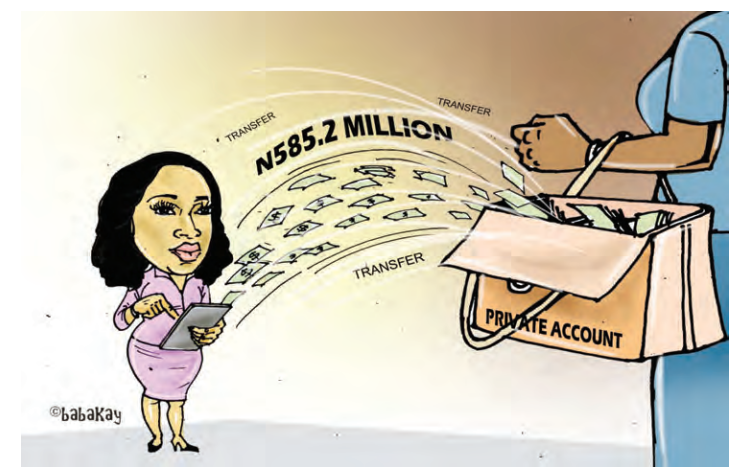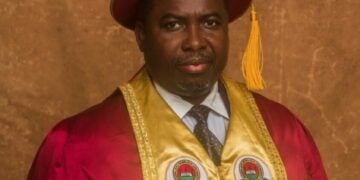The stench of corruption emanating from the Ministry of Humanitarian Affairs has become too overpowering to ignore.
In just the past week, two senior officials have been implicated in massive fraud totaling billions of naira meant for the country’s poorest citizens.
A couple of days ago, the now suspended Minister, Betta Edu, flagrantly circumvented the Financial Act of 2009, which stated that no public official shall in any circumstance pay public money into a private account and no private fund should be paid into public accounts.
Any violation of this act by any public official is deemed to be with the intention to embezzle the money.
Betta Edu was accused of paying a whopping sum of N585.2 million into the account of one Bridget Oniyelu Mojisola said to be an accountant in charge of the federal government projects to disburse funds meant to ameliorate the condition of the poor people in Ogun, Lagos, Cross River and Akwa Ibom states.
This was after she allegedly spent about N3 billion on some questionable pro-poor projects that is yet to be duly accounted for.
The uproar generated by this malfeasance was triggered by an online report that about N40 billion has been misappropriated under the former Minister of Humanitarian Affairs, Disaster Management and Social Development, Mrs Saddiya Umar Farouk.
President Bola Tinubu promptly suspended Edu and set up a probe panel to unravel the dirty deals that have rocked the ministry in recent months.
RELATED: Tinubu Suspends National Social Investment Programme Amid Corruption Scandal
Before then one Halima Shehu, the National Coordinator and CEO of the National Social Investment Programme Agency (NSIPA) was accused of transferring huge sums of money into different accounts.
The cycle of the putrid corruption and the personalization of public funds have stirred public resentment and the anger in the country is understandable because the huge sums being diverted are meant to ameliorate the deplorable conditions of the poor in the country.
The Economic and Financial Crimes Commission (EFCC) has swung into action and commenced investigation on the gargantuan fraud in the Ministry and the agency.
The Commission has reportedly recovered over N40 billion allegedly stashed away by these individuals.
President Buhari established the Ministry of Humanitarian Affairs in 2019 with the aim of consolidating various social intervention programs and better coordinating poverty reduction efforts.
Yet there is little evidence it has achieved anything beyond providing avenues for corruption.
Sadly, in the last three years alone an estimated N2 trillion has been allegedly stolen from the ministry.
For instance, Farouk once told a stupefied nation that she spent over N500 million to feed school children in over 124,000 households who were at home at the peak of the national lockdown due to the COVID-19 pandemic.
But she could not even provide a discernible template used in disbursing the funds.
After all these bogus spending, there is no record that the poverty situation in the country has improved.
Rather, more Nigerians have been plunged into deplorable poverty in the last three years.
According to the National Bureau of Statistics (NBS), about 133 million Nigerians are suffering from multi-dimensional poverty in Nigeria, which represents 63% of the country’s nearly 220 million estimated population even as the situation is predicted to get worse according to the World Bank due to the excruciating impact of the petrol subsidy removal.
We believe that the Ministry of Humanitarian Affairs and Poverty Alleviation is no longer necessary judging by the malfeasance that has bedeviled it in recent times.
President Bola Tinubu has spoken about improving the lives of those “struggling at the bottom of the pyramid.” Now is his chance to back up his words with action.
We suggest that President Tinubu should scrap the Ministry and also do away with other Ministries, departments and agencies that only exist as a platform for flawed individuals to loot the nation.
Shutting down this ministry does not mean abandoning the poor. On the contrary, we must find more effective and transparent ways of getting assistance to the millions struggling in poverty.
Nigeria already has enough agencies both local and international to fight poverty in the country.
Some of them include the National Directorate of Employment (NDE) which focuses on job creation and employment opportunities. It also provides training, financial support, and other resources to individuals and groups to help them start and grow their own businesses.
There is also the Conditional Cash Transfer (CCT) Programme that provides cash transfers to poor households in Nigeria. It is designed to help households meet their basic needs and improve their economic situation.
And under the UN-funded Sustainable Development Goals (SDGs) a serious investment and collaboration between the federal and state governments with the UN will go a long way to address the poverty concerns.
The humanitarian ministry must be scrapped immediately and its duties transferred to less tainted organs of government that will do their job with sincerity. The people’s welfare must finally come first.





